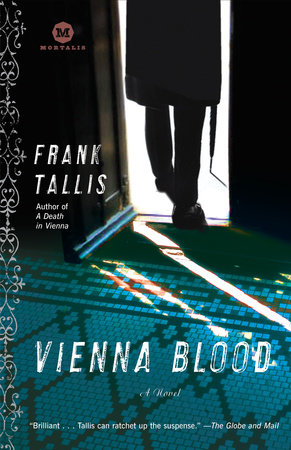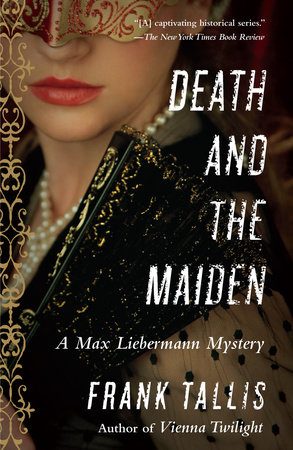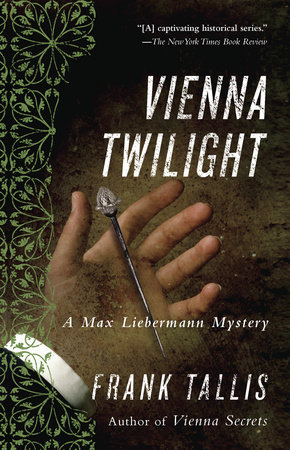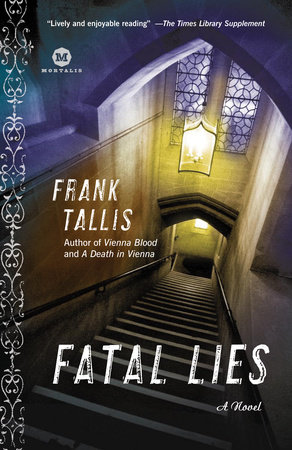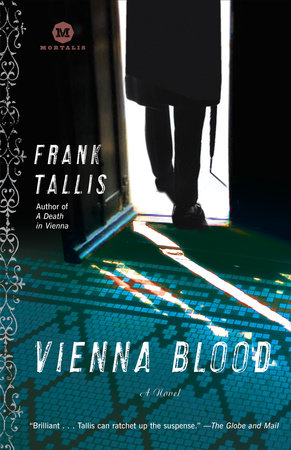Excerpt
Vienna Blood
The Italian lunged forward. He was a small, lean man, but very muscular. Any disadvantage he suffered because of his lack of height was amply compensated for by his sharp eye and astonishing speed.
Liebermann successfully deflected the foil’s thrust but lost his balance. He was unable to produce a counterattack and his opponent advanced yet again. The tip of the Italian’s foil came perilously close to the protective quilting over Liebermann’s heart. Recovering his footing, Liebermann chose to make a
passŽ–darting behind the Italian and taking a few steps backward. A trickle of sweat slid down his hot cheek. The Italian shrugged and walked away, flexing his foil in a gesture of indifference. After a few paces he swung around and adopted the preparatory stance, his chin tilted upward in an attitude of arrogance. Liebermann edged forward.
The Italian seemed to relax, his foil wilting a little in an apparently weaker grip. Liebermann noticed the subtle change and struck. A violent brassy clang was followed by the shriek of scraping metal: the Italian’s foil yielded, offering no resistance. Liebermann congratulated himself, believing that he had taken his opponent by surprise–but the concession was merely tactical. The Italian’s blade deftly flicked around Liebermann’s, displacing it with a powerful grazing action, and, once again, the tip of his opponent’s foil effortlessly penetrated Liebermann’s defenses. Liebermann retreated, executing a series of deflective maneuvers that barely contained the Italian’s renewed fierce attack.
{
3 } Frank Tallis They circled each other, occasionally touching blades in glancing contact.
“You should have anticipated my
froissement, Herr Doctor,” said the Italian gruffly. He tapped his temple and added: “Think, Herr Doctor! If you do not think, all is lost.”
Liebermann examined the blank oval of Signore Barbasetti’s mask, eager to observe some mark of humanity–a conciliatory expression or the glimmer of a smile, perhaps. The mesh, however, was impenetrable.
Their foils clashed again–blades flashing in a shaft of early-morning sunlight. A swarm of lazy dust motes was sucked into a miniature cyclone of displaced air.
Barbasetti produced a feint, switching from one line of attack to another, forcing Liebermann to draw back. However, the young doctor retained his composure and made a move that he intended should fail, thus provoking a predictable and powerful thrust from Barbasetti. Liebermann dodged and struck the forte of the Italian’s foil as he stumbled past–Barbasetti almost lost his grip.
“Bravo, Herr Doctor,” Barbasetti said, and laughed. “An excellent
falso!”
“Thank you, signor.”
Barbasetti came to a halt and lifted his blade, scrutinizing it closely. “Please excuse me, Herr Doctor.”
Barbasetti walked to the other side of the drill hall and pressed the hilt of his foil against the surface of a battered wooden table. He then hung a small iron weight from the tip and watched the metal blade bend. Its gentle curvature elicited an equivocal grunt from the watchful Italian.
“Is everything all right, signor?” Liebermann asked.
“Yes, I think so,” Barbasetti replied. The Italian raised himself up, marched back, and warned his student:
“En garde.” {
4 } Vienna Blood Immediately they were engaged, Liebermann’s foil sliding along his opponent’s blade until the hand guards crashed together. The fencing master pushed and Liebermann was thrown back: he landed awkwardly, but was nevertheless able to execute an impressive flying parry.
Barbasetti disengaged. “Much better.”
Liebermann noticed that the button at the end of his foil was trembling–he was feeling tired. After his lesson, he would have coffee and croissants in the little coffeehouse close to the Anatomical Institute. He would need something in his stomach to keep him going. . . .
“En garde!”Barbasetti barked again. The Italian had noticed that his student’s mind had begun to wander. Liebermann was astonished by the fencing master’s insight.
Again their blades connected, and the plangent clatter of contending steel filled the hall. Liebermann thought that Signore Barbasetti was tiring too. His pace had slackened slightly and his movements were less balletic. The Italian deflected Liebermann’s lunge, but failed to resume his guard. Observing the exposed chest protector, Liebermann recognized a rare opportunity. Excited by the prospect of victory, he raised his foil, ready to strike.
But the blow was never delivered.
His body froze, paralyzed by the inexplicable pressure that he felt against his heart. Dropping his gaze, he contemplated the tip of Signore Barbasetti’s foil, which had found its home precisely above the intercostal space separating ribs five and six.
Barbasetti pushed, and the cold steel curved upward.
“I don’t understand,” said Liebermann.
“You were not concentrating, Herr Doctor,” said the Italian. “Such an error would certainly lose you a competition . . . and of course, in some circumstances, your life.”
{
5} Frank Tallis Barbasetti lowered his foil and then raised it in salute.
Liebermann returned the gesture politely. In spite of the fencing master’s dramatic declaration, the young doctor was ashamed to find that he was still thinking of the little coffeehouse near the Anatomical Institute: crisp flakes of buttery pastry, a pot of plum jam, and a cup of very strong black coffee.
{
6}


